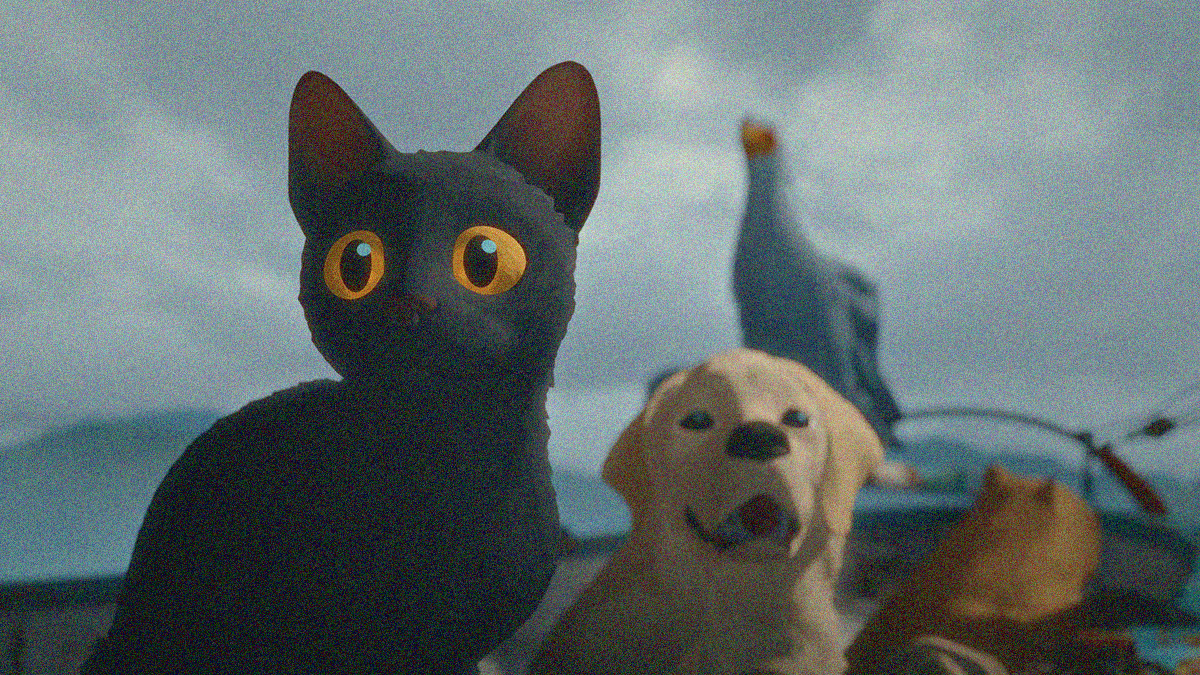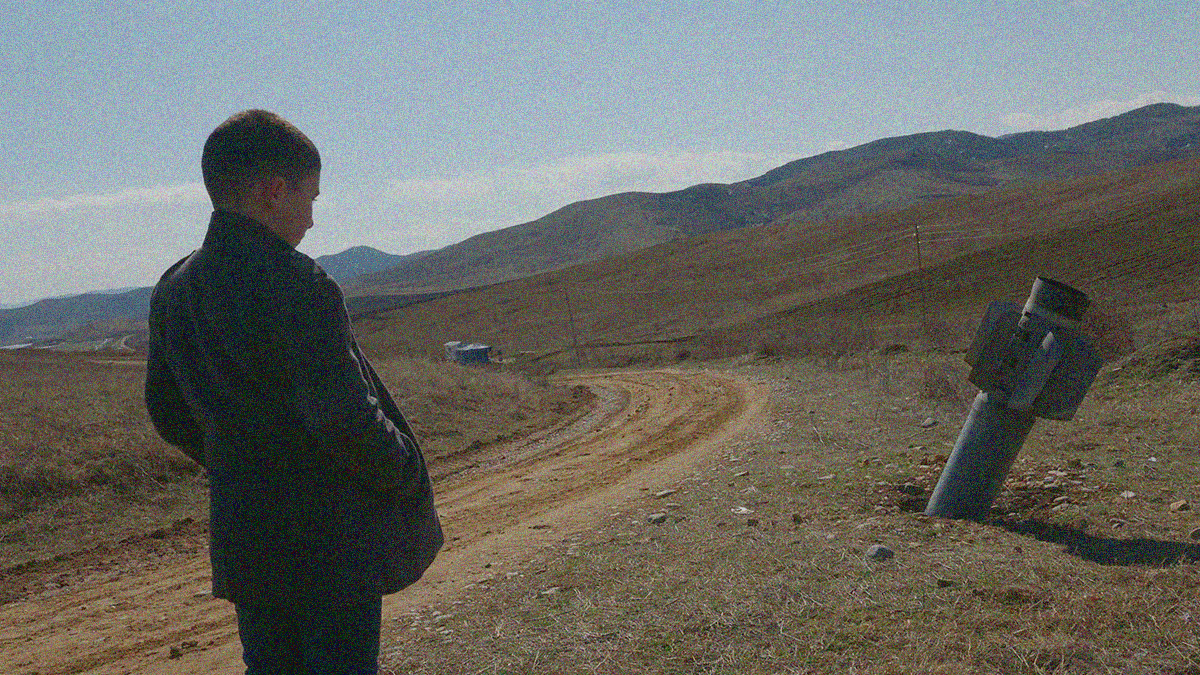The smaller studios are getting a big head start this year by sending their FYC slates a full two weeks or more before Thanksgiving. We’ve never had this many this early.
IFC. Mubi. Magnolia. Cohen Media Group. Music Box. Sony Pictures Classics. Kino Lorber. My watchlist is ballooning out of control. And that’s with Neon, A24, and the big Hollywood studios still to come.
Any suggestions on which to shift to the top of the pile are welcome. THE SUBSTANCE and JANET PLANET are probably there right now (THE BRUTALIST and ANORA would be there too, but I don’t have access yet). Then there’s INSIDE OUT 2, THE IMAGINARY, and ULTRAMAN RISING for animation. And DAUGHTERS, POWER, and SOUNDTRACK TO A COUP D’ETAT for documentary.
Time to get cracking.
What I Watched:
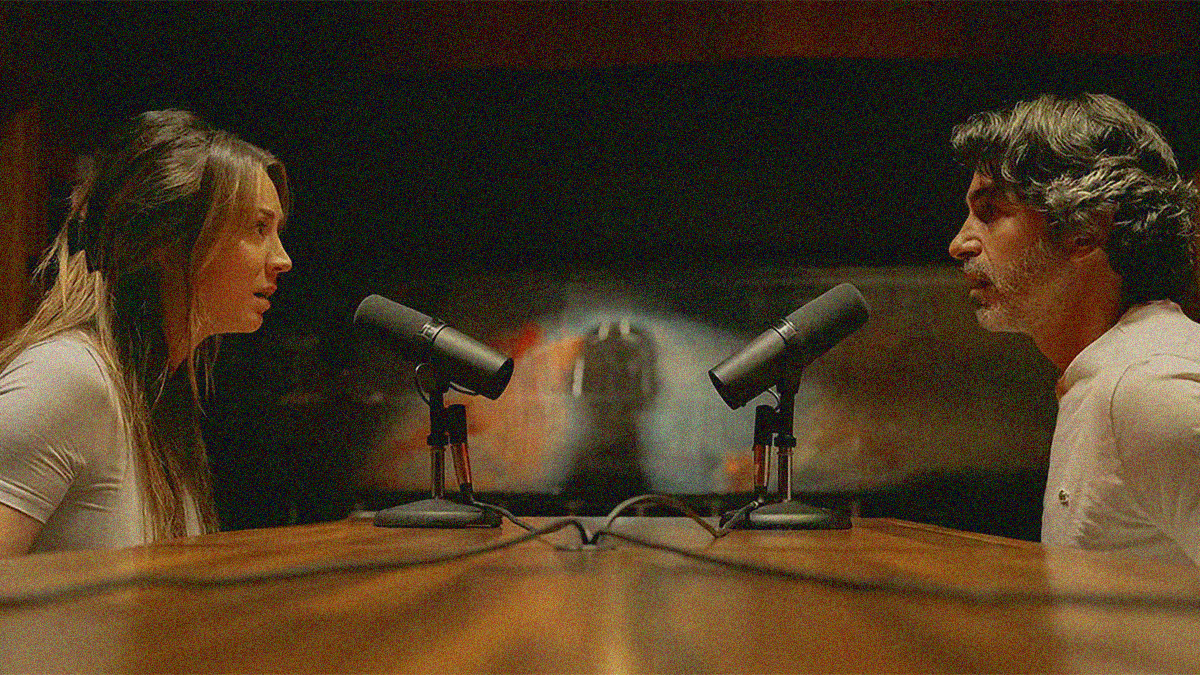
BASED ON A TRUE STORY: Season Two
(streaming on Peacock)
I did not anticipate Craig Rosenberg and company punting everything they did in the first season of Based on a True Story, but the season two premiere pretty much does exactly that. It makes sense logically since the podcast crashed and burned, but the appeal behind Matt Pierce (Tom Bateman) remains the fact that he's a serial killer. To watch him get neutered as a "recovering addict" in order to alleviate the red flags of Ava (Kaley Cuoco) and Nathan Barlett (Chris Messina) protecting him (without the promise of monetary profit) therefore proves extremely disappointing. Especially since every remaining loose thread must be tied off and excised to do so.
So, for the front half of this season, we're made to watch a completely different show devoid of any real thrills. Matt is in "recovery." He's probably the least important cast member beyond his position to hype Nathan up in a bid for the ex-tennis pro to reclaim his killer instinct and troll Ava when her sights move from West Side Ripper intrigue to a potential new threat to civilization. Matt's suddenly the boring elephant in the room smiling with New Age rhetoric about rebirth while the Barletts (and Liana Liberato's Tory) attempt to find normalcy. If normalcy can be found now that they've relinquished their morality.
It's not as much fun since they're coping with past crimes rather than facing present ones. By covering for Matt for so long, Ava and Nathan are just as guilty in the eyes of the law, but that conflict is old news now. The mutually assured destruction isn't a quid pro quo anymore. It's intrinsic to their lives. So, I guess you can say they're "dealing with it," but finding solace in new (old) outlets (tennis and amateur sleuthing) feels more like filler distraction than compelling drama. Why? Because it is. Everything that occurs in these first four episodes is either fully dropped or revealed as a means to an end. The show is treading water.
Excitement came from knowing Matt's identity and not knowing what he might do next. Take that chance for spontaneity away and it's nothing more than parallel mid-life crises suffered by protagonists who needed that wild card aspect to be interesting. Ava and Nathan are so out of synch that they barely share any screen time during the front half. It's all just her and new friend Drew (Melissa Fumero) or him and Matt feigning a relapse. Thankfully things change courtesy of a much-needed (unexpected) revelation in episode four. It might be undercut by a second (expected) revelation in episode five, but the propulsive energy that drove the entire first season finally returns.
Does the show stick the landing as a result? More or less. A final reveal arrives without much shock considering how intentional the show is about introducing a new character in a way that ensures we remember them without actually giving them anything to do, but the success of their unmasking is less about the who than the what. Yes, the what holds more intrigue for a third season teased via a mid-credit scene than for what came prior, but it is something. At least Ava and Nathan get to be together (and mad at Matt) during the last trio of episodes so Cuoco and Messina can hit their comedic stride. It will unfortunately just prove too little too late for many watching.
The same can be said for the continuation of the message that we're the real monsters feeding into the allure of murder and the desire to turn criminals into celebrities and victims into forgettable footnotes. The reason, of course, is that we don't know this new murderer. Where we got both sides of the equation by having Matt and Ava interact then, now it’s pure speculation. Add the fact that they are actively trying to stop the spree rather than exploit it and you almost find yourself thinking they're heroes. Maybe that's an intentional test too, but we don't really get to the "shame on you" portion of the programming until the finale's on-the-nose chastisement.
I still enjoyed myself, though. It's nowhere near as successful as the first season and does often feel like a bridge to more rather than a cohesive narrative of its own, but the acting is solid and the laughs earned (if dumbed down). Whereas the previous eight-episode run utilized a solid three-act structure to fill with satisfying drama and mystery, this one is caught pivoting away from building on the resulting danger to instead set-up a new danger in the background that we can't care about since the old one remains unresolved. So, now we await news of a renewal to (hopefully) receive solutions for both. I'm invested enough to keep going, but I won't be holding my breath.
- 5/10
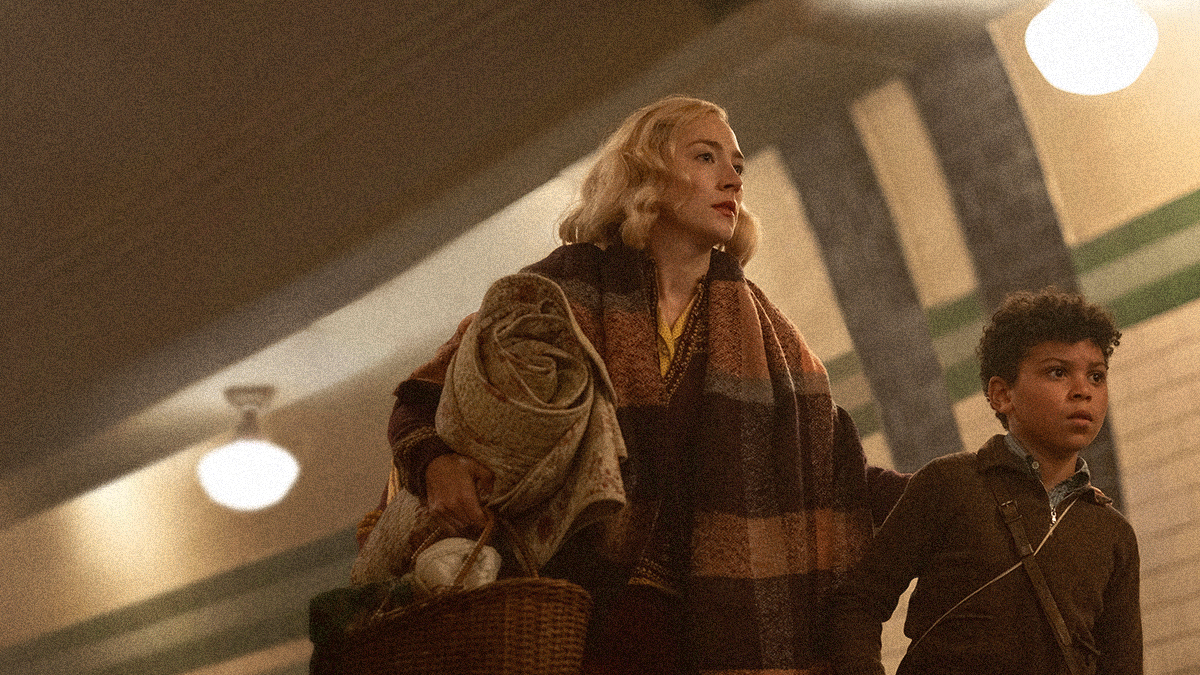
BLITZ
(streaming on AppleTV+)
London, World War II. Nightly bombings have begun and citizens have been forced to evacuate their children regardless of their ability to accompany them. Men are fighting, women are working the factories, and they're all struggling to find shelter the moment the sirens go off. Rita (Saoirse Ronan) doesn't want to send George (Elliott Heffernan) away, but she doesn't really have a choice now. It's for his protection and her peace of mind, but he doesn't want to go. Doesn't want to leave her. And why would he? His father was already forced to leave by their racist government. Now he's being forced out too?
You know that's what's going through this boy's mind. Because he's dealing with more than just surviving the Nazis. George is still trying to survive the British too. Ridiculed and abused for the color of his skin, he's never had it easy. The only safe haven he's ever known is home with Mom and Grandad (Paul Weller). So, leaving isn't a means for calm. One could say it will be even worse because there won't be anyone to protect him. It's why he's angry when Rita puts him on that train and why he's determined to get off it as soon as possible. Is jumping the tracks and running home through a war zone recommended? No. But in his mind, he has no other choice.
Written and directed by Steve McQueen, Blitz runs on two parallel journeys. The first is a survival/disaster film starring George as he deals with coppers threatening to put him on another train, bombs falling from the sky, racists wishing he'd get hit by one, and criminals (led by Stephen Graham and Kathy Burke) looking to exploit his diminutive size for their thieving. The second is a melodrama starring Rita as she tries to grieve her boy's absence, reckon with the past injustice that took his father away from her, and ensure her son makes it back home after discovering what's happened. We move back and forth to follow their paths while experiencing the tragic, historical circumstances surrounding them.
As such, I couldn't help thinking about 1917 throughout. George's trajectory is very similar to that of Lance Corporal Schofield insofar as having a singular mission that takes them into Hell. Whereas I found myself numb to the stakes in Sam Mendes' film, however, I did feel them this time around. Partly because a child witnessing these atrocities hits harder than a soldier (no matter how young), but mostly because we get to leave him and return to Rita. You don't see the tracks as clearly when you're given a reprieve every once in a while. Sure, you can still assume no critical harm will befall George, but the addition of a foil allows for an emotional investment to go along with the physical one. Their longing adds a lot.
So too do the set pieces McQueen has constructed. Each "chapter" brings with it a new environment for play and danger. A train car with new friends. A bomb shelter beside a Black man with the dignity and courage to stand-up for his humanity against those lashing out in fear (Benjamin Clémentine's Ife steals the show). A nightclub's raucous before and devastating after. A flooded subway tunnel with shades of Titanic panic. We go into each with the uncertainty of what might happen and leave with a mix of relief and horror since George's well-being isn't without the cost of others' lives. And we can catch our breath by revisiting Rita in-between. Her singing, charity, and love.
It's a simple film in many regards, but also a dense one in its levels of hardships spanning the general (Nazi bombs) and specific (race). Yes, there's the hope for George and Rita's reunion, but also the formation of an identity by a boy forced to confront this world's many evils all at once in a truncated period of time. That's where it excels and Heffernan delivers a fantastic debut to ensure it. Ronan and the supporting cast (including Harris Dickinson, Erin Kellyman, and Hayley Squires) are wonderful too, but Blitz lives or dies by our desire to see George succeed. Not just in his search for home, but also his quest for self-actualization. That alone makes it a solid feather on McQueen's cap.
- 7/10
FLOW
[Straume]
(limited release; Latvia’s submission for Best International Oscar)
Director Gints Zilbalodis has upped the ante with Flow by pretty much taking the same general concept used in his feature debut Away and making it bigger. His animation style has been given a glow-up with gorgeous texturing. The water is rendered with a photo-real quality that shines brightest when the "camera" is only half submerged. And the attention to overall detail increases through the decision to move this new adventure home (co-written with Matiss Kaza) from a dreamscape land of imagination to a world reminiscent of our own.
That's not to say it isn't still very fantastical in its seemingly post-apocalyptic execution of a planet on the cusp of a destructive cleanse, though. Our assumption via the overgrowth and abandonment of Cat's home (the house of an artist who loved carving feline statues or varying sizes) is that mankind is long gone. Once domesticated dogs run wild with the animals of the forest and the safety of dry land is soon consumed by an ever-increasing volume of water that drowns all in its path. If not for a beat-up rowboat, who knows what fate awaited these characters.
The way things are going at the start between those dogs, the cat, and a flock of secretary birds, they'd probably have ended up killing each other. One could therefore say the flood supplies salvation by triggering a survival sense able to dismantle their defenses. It's not always perfect, but the eventual line-up of Cat, Dog, Capybara, Bird, and Lemur proves to be as supportive as it is protective. They share food and shelter. They play with the baubles brought aboard by the thieving lemur (until it inevitably steals back what they take to returns it to its basket). They struggle to make their way together in an unfamiliar world.
It's a beautifully animated and choreographed film with suspenseful life or death moments and effective action (highlighted by a violent fight between secretary birds). What starts with the gradual rising of water (so, Cat has no choice but to jump onto the boat upon learning there's nowhere left to go) moves towards a tempestuous storm that's able to throw the animals overboard. Sometimes they throw themselves over to retrieve lost items or fish for food too, but mostly they bark, meow, and growl to make it plain what they each expect and desire. Their strong personalities come through with every plea, whine, and sigh.
I don't think Flow is quite as captivating a story as Away, but you cannot deny that Zilbalodis has evolved his craft in all other aspects. He's credited with art direction, cinematography, editing, and music (with Rihards Zalupe) too, so this is just as much his baby as the previous film (where he literally did everything himself). But it helps to have a team you can rely on so you can devote more time to what matters most. And since I thought Zilbalodis would sneak in for an Oscar nomination in 2020, I now think he's a shoo-in due to the polish he's added to an already unique style. The Academy must only embrace its non-verbal script.
- 8/10
MY SWEET LAND
(DOC NYC; Oscar qualifying run starts 11/29 at Laemmle Theatres)
“Yes, the story itself seems familiar to those paying attention to the many instances of violent displacement and ethnic cleansing occurring all over Asia, but familiarity doesn’t negate the importance of providing Artsakh a platform to be heard.”
– Full thoughts at jaredmobarak.com.
NIGHT IS NOT ETERNAL
(streaming on Max)
“Night Is Not Eternal proves a fascinating look at the troubles and struggles we all face in a flattening world ruled by opportunists of greed rather than stewards of protection.”
– Full thoughts at jaredmobarak.com.
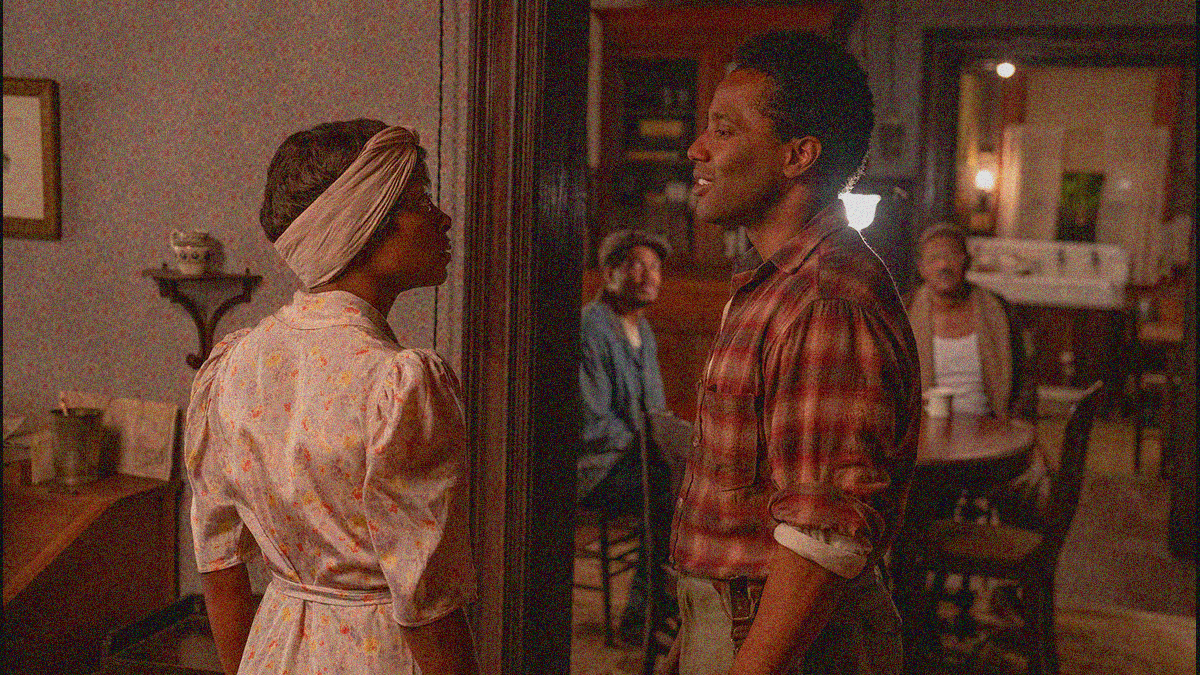
THE PIANO LESSON
(streaming on Netflix)
Malcolm Washington's adaptation (with Virgil Williams) of August Wilson's play The Piano Lesson is a stirring and resonant ghost story. Centered on a family haunted by its past both in the sense of being descended from slaves and having committed their own crimes as free men too, it grapples with legacy from two opposed vantage points born from the same sorrow. On one side is Boy Willie (John David Washington) on a quest to build upon what his father, grandfather, etc. left him. On the other is Berniece's (Danielle Deadwyler) wish to commemorate the struggle with the product of their pain.
Both siblings attempt to fulfill their desires through a piano left to them by their father. Well, it's probably more accurate to call it a piano he died to acquire that was subsequently left to them as a result. To Boy Willie it's an object imbued with value and thus ripe to be sold so he can buy a farm and own the land his ancestors worked. To Berniece it's a symbol that literally and figuratively holds the story of who they are—adorned by carved images of her family and soaked with their blood. It holds the potential for life and the memory of death, and it sits in Uncle Doaker's (Samuel L. Jackson) house unused because the ghosts it carries are better left locked inside. Or that's what they thought.
Because now, days after the death of the man Boy Charles (Stephan James as Boy Willie and Berniece's late father), Doaker, and their brother Wining Boy (Michael Potts) stole the piano from, it's obvious that the ghosts connected to this instrument exist outside its case. Sutter (Jay Peterson), killed after inexplicably falling down his well like many others back where their family was first enslaved, has finally found his lost possession and appears eager to reclaim it. Is his presence a product of guilt or evil? Is it perhaps a product of fear and, if so, what are Boy Willie and Berniece afraid of? That the piano is a harbinger of death or that the blood spilled was necessary to breathe life into a future that holds the promise of more?
It's a powerful question with a complex answer considering where they've all been and where they look to go. Boy Willie sees a return to that land as its steward as a means to exorcise the demons that loom over his shoulder. But he's the only one. Doaker would never want to go back. Neither does Lymon (Ray Fisher), a gullible family friend who's been helping Boy Willie chase his dream. They want to leave all that behind them and start fresh. To shake those demons loose and forget the hold they once had. Wining Boy and Berniece lie somewhere in the middle—yearning for something new despite seemingly never allowing themselves to take it.
What the audience therefore witnesses through this fight over the piano is a history lesson of their family and the ways in which they've blamed each other for their own mistakes. Doaker thinks that artifact is a curse, but knows Berniece won't part with it. So, he doesn't actively choose a side when Boy Willie demands to sell like Wining Boy does (he's with Berniece). Doaker simply airs their story to Lymon as a means of educating us and reminding his niece and nephew. It's ultimately their decision. He merely wants to ensure they don't forget the trouble it's been just as the ghost ensures that they also remember its value lies with more than just money.
That's the part that got me. Yes, the familial drama and historical angle captivates, but the addition of this supernatural entity by way of the family's fear to let go or move on takes it to another level. Because it only interrupts them or scares them when the prospect of giving the piano up arises. They say that "Sutter wants his property" back, but its presence reveals the opposite. It's not therefore about Sutter or any external force of malice. It's about them and the evil they manifest to protect themselves from doing the wrong thing. It makes sense too considering the piano's story is about revenge. If Sutter wants it back, they should want to keep it more.
Not just keep it, though. Appreciate it. That's where Avery (Corey Hawkins) comes in. Yes, he's present as a symbol of new beginnings for Berniece, but also as a figure of God in the metaphorical sense. The joke is that he's only decided to become a preacher so he'll never have to "do real work," so he's just as fake on one side as the ghost is on the other. But, just as the latter shakes them into action when the prospect of moving the piano arises, so too does he with the prospect of keeping it. Berniece wants it to remain, but its horror has a hold on her that might push her to the same violence she denounces Boy Willie for.
The only choice then is to reclaim it for themselves. To realize the piano isn't yet theirs. They must extricate it from the darkness of its origins by bringing it into the light of hope young Maretha (Skylar Aleece Smith) provides as their family's next generation. Only then can they end its hold as an albatross of pain. Only then can Boy Willie and Berniece stop their feud and repair their family from the injuries America wrought upon them. I really like Fisher here, but it's Washington and Deadwyler who take command from frame one. We must only pray that their passion doesn't end up feeding the instrument more blood.
- 8/10
PROBLEMISTA
(VOD/Digital HD)
How do you slay the dragon? By becoming the dragon. Elizabeth (Tilda Swinton) was trying to teach Alejandro (Julio Torres) this lesson from the start by giving him the blueprint to her insanity. It’s just tough to see the unearned confidence of white women as a potential tool to be used by yourself when you’re currently falling victim to its power. That’s the thing about desperation, though. Yes, it forces you to buckle to the pressures and anxieties of life by sacrificing your own dignity. But, for the truly desperate who’ve already lost themselves, it also provides the no-shits-left-to-give mentality necessary to turn the tables.
Torres’ (he also writes and directs) Problemista is a wonderfully zany expression of the frustrating and often impossible task of being seen in America when you’re not Elizabeth’s particular shade of bitch. Alejandro’s Salvadoran is victim to a system that’s quite frankly apathetic to his plight. It does the bare minimum to pat itself on the back for supplying immigrants the potential of the American Dream without actually setting up any infrastructure to make it possible as more than the result of a fluke accident for those lucky enough to survive the gauntlet that is the visa process.
Alejandro can’t stay in America without a sponsor, but no one will sponsor him unless they trust his ability to do the job. Unfortunately, he can’t get paid until they do sponsor him despite needing a revenue stream to stay long enough to prove they should. So, when Elizabeth offers the opportunity to earn that trust by working pro bono to satisfy her fantasy of giving her cryogenically frozen painter husband (RZA’s Bobby) the solo show he never secured while conscious, the aspiring toy designer jumps at the chance. Alejandro will put up with her nonsense and demean himself with gig jobs on Craigslist (hilariously brought to personified life by Larry Owens). Whatever gets him that signature before his time is up.
The whole endeavor is cast under a sheen of sketch comedy surrealism between a childhood steeped in fable (Catalina Saavedra tried to create a safe environment for her son where imagination trumped reality) and the constant devolution towards nightmarish community theater daydreams of heated interactions with Elizabeth. Alejandro is intuitive, industrious, and determined—traits that ensure he won’t just quit on his dream as well as qualities that allow him to deflect most of the attacks his new boss is used to unleashing with instant and devastating precision. The only question is whether he can delay Elizabeth’s inevitable discovery of his “treachery” until after achieving her goals.
He won’t succeed if he continues to let everyone push him around, though. And that includes Elizabeth. So, he’ll need to adopt her proclivity for melodrama and fabrication to not only secure his future in America, but also to divert her tempestuous temper away from him to do it. Alejandro must slay his dragons, so to speak, by utilizing their potent attacks without the self-defeating baggage of their insecurities. That means conquering the job to reacquire Bobby’s paintings to sell. Conquering Elizabeth’s penchant to sabotage her own interests so as not to sabotage his own. And conquering America’s brazenly unfair system of stealing and profiting off the backs of immigrants before kicking them out criminals.
Torres is great in the lead he’s written for himself. The mix of exasperation and excitement is key to endearing Alejandro to us while his deadpan sarcasm towards the troubles that ail him punch up the satirical nature of this bureaucratic nightmare. Having Isabella Rossellini narrate from an omnipresent position lends it a warped fairy tale vibe of a hero in distress. And Swinton steals the show with an unhinged Karen-esque performance so far down the stereotype that other Karens can’t even stand her. Yet she still isn’t as monstrous as the system. In fact, she’s also a victim of it. The way Swinton toes that line between unjustly abhorrent and justifiably embittered is therefore nothing short of genius.
- 8/10
Cinematic F-Bombs:
This week saw THE DILEMMA (2011) and THELMA (2024) added to the archive (cinematicfbombs.com).
Fred Hechinger dropping an f-bomb in THELMA.
New Releases This Week:
(Review links where applicable)
Opening Buffalo-area theaters 11/22/24 -
BONHEFFER: PASTOR. SPY. ASSASIN. at AMC Market Arcade; Regal Elmwood, Transit, Galleria & Quaker
GLADIATOR II at Dipson Amherst, Flix & Capitol; AMC Maple Ridge & Market Arcade; Regal Elmwood, Transit, Galleria & Quaker
I WANT TO TALK at Regal Elmwood
MECHANIC ROCKY at Regal Elmwood
WICKED at Dipson Amherst, Flix & Capitol; AMC Maple Ridge & Market Arcade; Regal Elmwood, Transit, Galleria & Quaker
ZEBRA at Regal Elmwood
Streaming from 11/22/24 -
ALIEN: ROMULUS – Hulu on 11/22
BLITZ – AppleTV+ on 11/22
Thoughts are above.
JOY - THE BIRTH OF IVF – Netflix on 11/22
OUT OF MY MIND – Disney+ on 11/22
PIMPINERO: BLOOD AND OIL – Prime on 11/22
RITA – Shudder on 11/22
THE PIANO LESSON – Netflix on 11/22
Thoughts are above.
SPELLBOUND – Netflix on 11/22
TRANSMITZVAH – Netflix on 11/22
DEAR SANTA – Paramount+ on 11/25
FAMILY GUY: GIFT OF THE WHITE GUY – Hulu on 11/25
OUR LITTLE SECRET – Netflix on 11/27
MONONOKE THE MOVIE: THE PHANTOM IN THE RAIN – Netflix on 11/28
SWEETHEARTS – Max on 11/28
Now on VOD/Digital HD -
ABSOLUTION (11/19)
ALL SHALL BE WELL (11/19)
DON’T TELL MOM THE BABYSITTER’S DEAD (11/19)
GOD’S HERE (11/19)
JACKPOT! (11/19)
SMILE 2 (11/19)
STREET TRASH (11/19)
TURTLES (11/19)
SPY X FAMILY: CODE: WHITE (11/20)
“SPY X FAMILY excels both in the familial comedy and thrilling suspense. It definitely feels episodic in nature with a desire to make more installments, so don't expect anything crazy in terms of narrative besides a nice mix of exposition and adventure.” – Full thoughts at HHYS.
WINNIE THE POOH: BLOOD AND HONEY II (11/21)
ARMOR (11/22)
EUREKA (11/22)
“It's a contemplative piece that moves at a glacial pace to live in its anguished weariness. Alonso and company are simply holding up a mirror onto the burden carried upon the exasperated shoulders of the displaced and marginalized.” – Full thoughts at HHYS.
THE FIX (11/22)
NEVER LOOK AWAY (11/22)
THE SHADE (11/22)
TRAPPED INN (11/22)
WHITEOUT (11/22)
THE WORLD ACCORDING TO ALLEE WILLIS (11/22)





